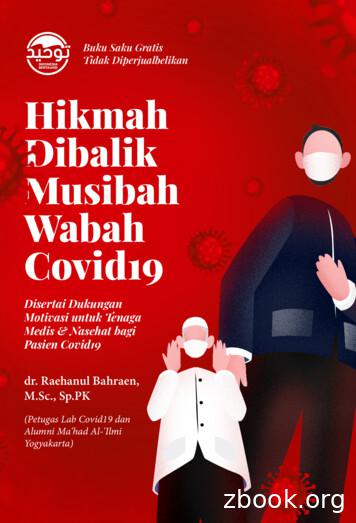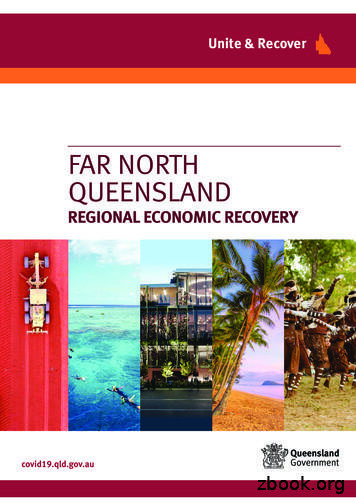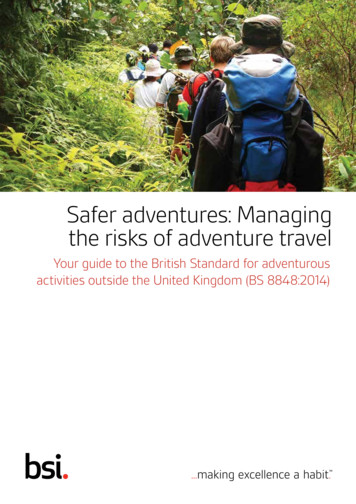NSFA COVID19 Return To Training Guidelines
NSFA COVID19Return to Trainingguidelines22/05/2020
Purpose of this documentThe following document aims to provide guidance to any football specific matters that have notbeen addressed in the Football NSW ‘Return to Training’ guidelines.NSFA adopts the Football NSW ‘Return to Training’ guidelines, along with enforcing the current NSWPublic Health Order.The following links provide in depth information about our responsibility regarding COVID19 and asafe return to sport.NSW Health - Pages/default.aspxFootball NSW Return to Training guidelines - https://footballnsw.com.au/return-to-training/NSFA Updates - https://nsfa.asn.au/NSW Office of Sport - 9A return to football and training is not mandatory.We believe this should be a decision for everyone to make due to their personal circumstances.NSFA Clubs understand if some individuals do not wish to immediately return to training.Please note, this document will be updated and published on the NSFA website. Please visit thewebsite for the latest version.
COVID19 ProtocolSymptoms of COVID19Symptoms of COVID-19 include fever, cough, sore/scratchy throat and shortness of breath.Other reported symptoms of COVID-19 include loss of smell, loss of taste, runny nose, muscle pain,joint pain, diarrhoea, nausea/vomiting and loss of appetite.If you encounter someone with COVID19If you have been identified as having had close contact with someone diagnosed with Coronavirusdisease (COVID-19) someone from your local public health unit will be in contact with you daily whileyou are at risk of infection to monitor you for symptoms. You must isolate yourself in your home for14 days after last contact with the confirmed case.Please read the following Government Health advice close-contacts-of-a-confirmed-case 0.pdfIf you are COVID19 positive, please follow the NSFA protocol to ensure we provide a safeenvironment for all participants.Person responsibleActionStep 1Player / Parent / GuardianContact NSFA ClubStep 2NSFA ClubContact NSFAConfirm NSW Health are awareStep 3NSFA Club & NSFAContact all members that may have comeinto contact with the positive COVID19individualNSFA to provide NSW Health, NSFA memberinformation if requiredNSFA to communicate with FNSW
NSFA Return to Training requirementsAs at 22/05/2022 the NSW Public Health Order allows Groups of 10 people to gather outdoors.Social distancing of 1.5m continues to be enforced.Under Football NSW guidelines, approved by the NSW Office of Sport, football activity must meetthe following restrictions:Prior to the commencement of training, all NSFA Clubs were required to submit the followingdocumentation: Club Training Schedule Club Health & Safety guidelinesAll Clubs that have met the above-mentioned restrictions will be given approval from NSFA to returnto training.The following page outlines the minimum Club Health and Safety guidelines. This outline worksalongside the FNSW guidelines, with both implemented to ensure a safe environment.
NSFA HEALTH AND SAFETY GUIDELINES – COVID19Effective from 22 May 2020 until further notice.As a Club, we commit to the following practices to ensure the football environment we provide ourmembers adheres to NSW State Government restrictions and to take the following health and safetypractices to ensure our members health. The following document applies to training.NSFA Health & Safety requirementsAll Change rooms MUST be locked and not used**- If toilet facilities at a venue are located via the change room, we permit the changeroom to be open, however a laminated sign MUST be displayed outside the changeroom to indicate ‘no use of change room, other than for toilet use’NSFA Club guidelines to be implemented:Members refers to all coaches, players, parents, guardians.1. If a member tests positive to COVID19 the Club MUST be notified as soon as possible.2. We encourage all members to download the COVIDSAFE app from the Australian Government,however, understand we cannot force people to download it.3. Members feeling ill should not attend training. If a player attends training showing obvious signs(cough, running nose, vomiting, lethargic) of illness they will be sent home.4. If a player is injured and cannot participate in the session, then they are not required to attendtraining.5. We will adhere to the maximum capacity of players/teams per field as outlined in the by FNSWand the NSFA Training Allocation guidelines – COVID19 document.6. We will adhere to NSW Govt restrictions of 10 person groups within a small area, where eachindividual has at least 4m² space available.7. We will implement staggered start times to our training sessions to reduce the gathering ofpeople at venues. Coaches will strictly adhere to start and finish times. Players cannot enter thefield early and are requested to leave the field, and the facility immediately after training.Initially training is reduced to two sessions per week for all teams, and training duration persession is reduced, to allow all teams the opportunity to train in a safe environment.8. We urge members to ‘travel light’ with only required persons attending drop off & pick up fortraining (ie. One parent, no siblings, no dogs etc.). We prefer parents and guardians do notgather on the sidelines to watch training and instead stay in the car.9. NTRA change rooms will be locked; the public toilets will be open.10. Charles Bean change rooms will be open to access the toilets only; they are not to be used forshowers, to get changed, or to store bags/personal belongings.11. The simple message for training – “get in, TRAIN, get out”12. Coaches will NOT use bibs unless necessary. If bibs are used, they will be freshly laundered andwill not be shared by other players.13. Goalkeepers MUST only use their own gloves.14. No drink bottles will be shared.15. Coaches will enforce a strict ‘no touching rule’ - pre, post and during training sessions.16. Coaches will conduct sessions that are low contact in compliance with FNSW guidelines.17. Coaches will apply hand sanitiser before/after sessions, players are recommended to do thesame.
COVID-19: Return to Football - Coach InformationImportant informationAll football participants including coaches, players, match officials, club officials and any otherperson at the venue are responsible for stopping the spread of the virus. The following guidelinesare designed to assist in understanding ways that you can help.Return to training – Level 1 ‘Get In, Train, Get Out’Football Safety RequirementsMaximum Groups of 10– 1 Coach and 9 Playersper 1/4 fieldKeep a record ofattendance through theApp your team uses, orby taking a photo of theteam each sessionGroups to be split intotwo training groupsbefore players arrive.I.e., Group 1 & Group 2Deliver non-contactunopposed skill-basedtraining practicesOutline guidelines to allplayers on arrivalbefore any footballcommencesEngage players with anarrival activity as soonas they are on the pitchDrink break stations Direct players to placetheir individual bottlesin a safe area 1.5metresaway from othersEnsure changeroomsand showers are notusedEnsure toilets are openand have soap andsanitiser availableDisinfect equipmentthat you have handledbefore packing it awayCoach must set-up andpick up all equipmenteach sessionPermitted: Goals, balls,cones, hand sanitizer,tissues, individualbottles, disposablegloves recommendedUnpermitted: Contact,Small-Sided Games,bibs, no handling ballswith bare hands, nothrowsOne coach per group.All players must besupervised at all timesHealth and Hygiene RequirementsIf you have a fever,cough, shortness orbreathe, fatigue or sorethroat, do not attendtrainingUse hand sanitzerbefore and afterhandling equipmentNo sharing of drinksbottles and no spittingCover your coughs andsneezes with your elbowor a tissueNo physical greetingssuch as handshaking,hugs or fist bumpsPut used tissues in thebin immediately afteruseAvoid touching eyes,nose or mouths
Coach session delivery assistanceFor session plans, tips and guidance on ensuring your training sessions follow the guidelines and aresafe, organised, and enjoyable please sign up for our INSPIRE FC curriculum, free to all NSFAregistered coaches https://nsfa.asn.au/coaches/inspire/Treating injured playersNSFA encourages coaches and managers to provide first aid and treatment to players in a safemanner.If the incident is beyond the capabilities of the person responsible for treatment, it is advised thatyou contact the players emergency contact (ie. Parent) and if required an ambulance.If treatment to a player is for minor issues such as a bleeding nose or clash of limbs, gloves arerecommended to be used. Coaches should not touch a player unless invited to do so by the injuredplayer or extremely necessary to stem the flow of blood. Please act responsible and use commonsense in all scenarios.FootballsCoaches and players SHOULD NOT touch footballs with their hands. Please encourage people to onlyuse their feet!This will be the most important football teaching due to COVID. No goalkeepers (unless wearing gloves. If wearing gloves, no spitting or wiping face withglove) No throw-ins. Simple play a pass or dribble inCleaning equipmentNSFA recommends the following pieces of equipment are cleaned after each session; Goals / poles – Simple spray and wipe Cones – If sharing, please spray and wipe down before handing to someone else Bibs – After each use. Washing machine clean Goalkeeper short / gloves – After each use. Washing machine cleanBalls are not required to be cleaned unless players have touched them with their hands.Do not share whistles.Hand sanitizer & Player cleanlinessWe recommend ALL players and coaches to apply hand sanitizer prior to and after training.Team managers / Coach should have hand sanitizer available mid-session in case a situation ariseswere application is required.All participants are advised to shower after each session and wash their clothes.
Player informationAs outlined above, please maintain cleanliness, shower after session and wash your clothes.Players Guidelines for TrainingPrepare and dress for training at home before arrivalShower at home before and after your trainingWash your hands with sanitizer before and after trainingArrive for training 5 minutes prior to start timeRemain 1.5 metre distance from before, during and after trainingFill, bring and label your own drink bottle from home and do not share with othersPlayers to leave the venue safely and immediately once training has concludedPlayers are advised to use the toilet at home prior to trainingParent InformationParents on the sideline at trainingNSFA and Football NSW do not recommend parents to be present during training sessions unlessnecessary. It is our duty to ensure we limit the amount of people at, or around council facilities.Parents are advised to wait in their car if picking up young children. Team managers and coachesmay request certain parents to be available for sessions to ensure a safe and controlledenvironment.Drop Off/Pick UpWe urge members to ‘travel light’ with only required persons attending drop off & pick up fortraining (ie. One parent, no siblings, no dogs etc.).Players must arrive only 5 minutes prior to the start time of training. If you arrive early, please stayin the car.We prefer if parents and guardians do not gather on the sidelines to watch training. We recommendpick up arrangements are organised prior allowing parents to stay in the car or come back at the endof the session.For parents of young children we ask for you to drop and collect your child at the correct time toavoid hanging around, please follow social distancing guidelines.
FacilitiesUse of changeroomNSFA has ordered all Clubs to close the changeroom at venues to minimise the spread of COVID19.Toilets that are accessed via changerooms will have a clear sign that indicates the use of thechangeroom is not permitted, other than use of the toilet.Use of toiletsWe encourage participants to use their home toilet and bathroom prior to attending training tominimise the use of public toilets and therefore the spread of COVID19.It is recommended that toilets be regularly ‘wiped down’ to ensure a safe environment. This involveswiping areas such as cubicle locks, taps and door handles, toilet flush buttons etc with disinfectantwipes or sprayed with Glen20 (or similar) at the conclusion of each night / booking.Where possible, Clubs will assign a person to be responsible for this at the end of each night /booking. This can be a different person based on who will be present on any given night.Soap or hand sanitiser should be available within each toilet block to ensure players are washing orsanitising their hands before returning to the group.NSFA Competition FormatAs per our previous update, the Competitions Department have scheduled games for the firstweekend of June. This start date is looking increasingly unlikely with NSFA and Football NSW seekingapproval to commence competition in early July.The Competitions Department will strive to deliver a 14 week competition, however, this is largelydependent on the start and end date of the season which is TBC.The competition structure, final series and promotion and relegation will be determined by thelength of the season. We will update you as more information comes to light.Please keep an eye on the draw for any changes. Clubs will be informing us next week if there areany team withdrawals.
and the NSFA Training Allocation guidelines - COVID19 document. 6. We will adhere to NSW Govt restrictions of 10 person groups within a small area, where each individual has at least 4m² space available. 7. We will implement staggered start times to our training sessions to reduce the gathering of people at venues.
Covid19 - Standard Operating Procedures – UNHAS ROSS COVID19 – SOP v.1 2 Apr 2020 Page 4 of 20 1.6 General guidance and directives For all UNHAS staff and Air Operators while in ROSS and in .
work/products (Beading, Candles, Carving, Food Products, Soap, Weaving, etc.) ⃝I understand that if my work contains Indigenous visual representation that it is a reflection of the Indigenous culture of my native region. ⃝To the best of my knowledge, my work/products fall within Craft Council standards and expectations with respect to
Contoh Program KKN-PPM Daring dalam Masa Pandemi Covid19 Dokumentasi KKN-PPM UGM Periode 1 (Maret-April 2020) dan Periode 6 (Mei –Juni 2020)
Protectionist policies from the 2007-2008 food price crisis . global trade was in categories that did not exist in 1992. 3D printing (3DP) has played a direct role in easing the pressure on supply chains and governments during the COVID19 outbr
Menyerah Melawan Covid19 Bijak Dalam Menerima & Menyebarkan Berita Tentang Covid19 Musibah Yang Lebih Besar Dari . seorang muslim yang yakin bahwa semua takdir Allah pasti ada hikmahnya. Salah satu hikmah terbesar adalah agar m
COVID19 State CPA Profession and Licensure Status Updated: 29 May 2020. * NASBA has recommended to Boards of Accountancy that have CPE reporting years ending on or before October 31, 2020, to
covid19.qld.gov.au. A VISION FOR THE FUTURE Our vision for Queensland’s recovery from this pandemic is threefold – we are working to protect the health of every Queenslander, we are creating jobs, and we are work
the risks of adventure travel. Adventure travel is supposed to be challenging. But regardless of your age, destination or chosen activity, your safety should be of paramount importance. BS 8848 sets standards to minimize the risks of adventure travel. Knowledge of the standard is important to anyone organizing, or taking part in, an overseas venture. 2 Hundreds of thousands of people take part .























